Angels: Difference between revisions
(Phew!) |
No edit summary |
||
| Line 1: | Line 1: | ||
[[Image:OP angel sachiel face clean.jpg|thumb|right|"Angel face".]] | |||
'''Angel''' (使徒, ''shito'') is an ambiguous term that has various meanings within the ''Evangelion'' mythos depending on context. | '''Angel''' (使徒, ''shito'') is an ambiguous term that has various meanings within the ''Evangelion'' mythos depending on context. | ||
| Line 11: | Line 13: | ||
:"[This is] the bringer of life to this planet, and the agent of its extinction. The Second Angel, Lilith."</ref><ref>[[Episode 26']]. Misato: "Shinji-kun, we humans were born from the one called Lilith -- a source of life, just like Adam. We are the 18th Angel."</ref>), the natural progeny of Adam (3rd~16th), the human-shaped vessel of Adam's soul (17th: [[Kaworu Nagisa]]), and ''Homo sapiens'' itself (18th: Lilin). | :"[This is] the bringer of life to this planet, and the agent of its extinction. The Second Angel, Lilith."</ref><ref>[[Episode 26']]. Misato: "Shinji-kun, we humans were born from the one called Lilith -- a source of life, just like Adam. We are the 18th Angel."</ref>), the natural progeny of Adam (3rd~16th), the human-shaped vessel of Adam's soul (17th: [[Kaworu Nagisa]]), and ''Homo sapiens'' itself (18th: Lilin). | ||
This conflict between the heavily-reinforced concept of "Angel" (god-like beings antithetical to human life) and the more inclusive version rightfully raises the question of what an Angel is actually intended to be. ''Evangelion'' plays a similar game with terms related to humanity (''hito'', ''ningen'', and ''jinrui''). | This conflict between the heavily-reinforced concept of "Angel" (god-like beings antithetical to human life) and the more inclusive version rightfully raises the question of what an Angel is actually intended to be. ''Evangelion'' plays a similar game with terms related to [[human|humanity]] (''hito'', ''ningen'', and ''jinrui''). | ||
===Analysis=== | |||
One possibility is that "Angel" actually refers to all beings whose origin is ultimately traceable to the [[First Ancestral Race]]. This species, the prototypical humans of NGE, produced the Seeds of Life in order to propagate new lifeforms on distant worlds, into which the F.A.R.'s souls would be reincarnated.<ref>Neon Genesis Evangelion 2: Another Cases. Kaworu's Scenario: Good Ending.</ref> Consider also that both "angel" and "apostle" (the literal meaning of Angel's Japanese equivalent, ''shito'') inherently mean "messenger". Furthermore, the F.A.R. are stated to be esteemed as gods by Adam's children and the Lilin.<ref>''[[Neon Genesis Evangelion 2]]''. [[Classified_Information_(Translation)#First_Ancestral_Race|Classified Information. First Ancestral Race.]]</ref> (On a perhaps related note, Rei muses, "What is a human? A creation of God? Is man a human creation?")<ref>''[[Neon Genesis Evangelion]]''. [[Episode 14]]. Platinum subtitles.</ref> "Angels", then -- which we know to refer to both Seeds of Life and their progeny -- could be thought of as "messengers" for their "God(s)". The "message" to be disseminated is humanity itself. | |||
==Translation== | |||
{{expand}} | |||
The characters in NGE are actually calling the Angels "shito", which means "apostle", while the Japanese word normally used for the western concept of Angel is "tenshi". However, this isn't a translation mistake on the part of NGE's U.S. distributors. The "Angel" designation is clearly seen in the show's opening and at various times within the show itself, and the word "Angel" was retained in the English version of the show at the request of the show's Japanese creators{{fact}}. | |||
[[Neon Genesis Evangelion Proposal|At one point in the show's production]], the term "Apostolo" was going to be used as a counterpart to "shito" instead of "Angel". | |||
==Adam's Children== | ==Adam's Children== | ||
Unleashed from Adam's [[White Moon]] during [[Second Impact]] and unaccounted for until their sequential pilgrimages to Tokyo-3 fifteen years later, starting with the 3rd Angel, Sachiel. Should any of the Angels succeed in reaching Adam or Lilith, mankind would be destroyed in a destructive [[Third Impact]]. It is the task of the [[Evangelions]] and their pilots to defeat Adam's children, in accordance with both [[Gendo Ikari]]'s and Seele's plans. | "Angels" as they are most often regarded. Unleashed from Adam's [[White Moon]] during [[Second Impact]] and unaccounted for until their sequential pilgrimages to Tokyo-3 fifteen years later, starting with the 3rd Angel, Sachiel. Should any of the Angels succeed in reaching Adam or Lilith, mankind would be destroyed in a destructive [[Third Impact]]. It is the task of the [[Evangelions]] and their pilots to defeat Adam's children, in accordance with both [[Gendo Ikari]]'s and Seele's plans. | ||
'''See''': [[Angels (Adam's Children)]] | '''See''': [[Angels (Adam's Children)]] | ||
| Line 55: | Line 67: | ||
| [[Image:Eva2-22 C0026B crop.jpg|175px]] | | [[Image:Eva2-22 C0026B crop.jpg|175px]] | ||
| [[Third Angel]] | | [[Third Angel]] | ||
| Discovered in permafrost prior to Sachiel's attack. Fought [[Evangelion Unit-05]] at [[Bethany Base]] in ''[[Evangelion 2.0: You Can (Not) Advance|Evangelion 2.0]]''. | | Discovered in permafrost prior to Sachiel's attack. Fought [[Evangelion Unit-05]] at [[Bethany Base]] in ''[[Evangelion 2.0: You Can (Not) Advance|Evangelion 2.0]]''. | ||
| - | | - | ||
| - | | - | ||
| Line 90: | Line 102: | ||
| [[Image:Eva2-22 C0124 ticktock.jpg|175px]] | | [[Image:Eva2-22 C0124 ticktock.jpg|175px]] | ||
| [[Seventh Angel]] | | [[Seventh Angel]] | ||
| An incredibly tall clock-like Angel | | An incredibly tall clock-like Angel. | ||
| - | | - | ||
| - | | - | ||
| Line 179: | Line 191: | ||
| ? | | ? | ||
|} | |} | ||
==References== | ==References== | ||
Revision as of 17:56, 5 March 2011
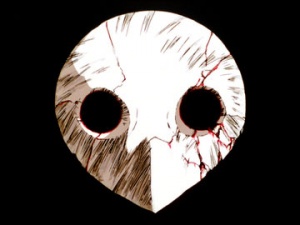
Angel (使徒, shito) is an ambiguous term that has various meanings within the Evangelion mythos depending on context.
Usage
As most commonly used in the show and elsewhere, the word "Angel" refers to any of Adam's fifteen children, who Nerv must systematically destroy over the course of the story. Adam itself, the designated "First Angel", is occasionally included with its offspring when speaking of Angels collectively.[1]
However, considering Seele's list of designated "Angels" in full, it includes entities as disparate as the Seeds of Life (1st: Adam and 2nd: Lilith[2][3]), the natural progeny of Adam (3rd~16th), the human-shaped vessel of Adam's soul (17th: Kaworu Nagisa), and Homo sapiens itself (18th: Lilin).
This conflict between the heavily-reinforced concept of "Angel" (god-like beings antithetical to human life) and the more inclusive version rightfully raises the question of what an Angel is actually intended to be. Evangelion plays a similar game with terms related to humanity (hito, ningen, and jinrui).
Analysis
One possibility is that "Angel" actually refers to all beings whose origin is ultimately traceable to the First Ancestral Race. This species, the prototypical humans of NGE, produced the Seeds of Life in order to propagate new lifeforms on distant worlds, into which the F.A.R.'s souls would be reincarnated.[4] Consider also that both "angel" and "apostle" (the literal meaning of Angel's Japanese equivalent, shito) inherently mean "messenger". Furthermore, the F.A.R. are stated to be esteemed as gods by Adam's children and the Lilin.[5] (On a perhaps related note, Rei muses, "What is a human? A creation of God? Is man a human creation?")[6] "Angels", then -- which we know to refer to both Seeds of Life and their progeny -- could be thought of as "messengers" for their "God(s)". The "message" to be disseminated is humanity itself.
Translation

|
"Making something... Nurturing something is really great. You can see and learn so many things from the process." |
The characters in NGE are actually calling the Angels "shito", which means "apostle", while the Japanese word normally used for the western concept of Angel is "tenshi". However, this isn't a translation mistake on the part of NGE's U.S. distributors. The "Angel" designation is clearly seen in the show's opening and at various times within the show itself, and the word "Angel" was retained in the English version of the show at the request of the show's Japanese creators[Source needed].
At one point in the show's production, the term "Apostolo" was going to be used as a counterpart to "shito" instead of "Angel".
Adam's Children
"Angels" as they are most often regarded. Unleashed from Adam's White Moon during Second Impact and unaccounted for until their sequential pilgrimages to Tokyo-3 fifteen years later, starting with the 3rd Angel, Sachiel. Should any of the Angels succeed in reaching Adam or Lilith, mankind would be destroyed in a destructive Third Impact. It is the task of the Evangelions and their pilots to defeat Adam's children, in accordance with both Gendo Ikari's and Seele's plans.
List of Angels
This is a breakdown of all numbered Angels according to the three main Evangelion continuities.
Seele is thought to obtain the Angel names and ordinals from the Secret Dead Sea Scrolls. It is unclear why entities such as the Evangelions (copies of the Seeds) and Rei Ayanami (Lilith's "answer to" Tabris) are not included, since they would seem to possess all of the required qualifications, under the more expansive definition of "Angel".
According to a statement made by Gendo in Evangelion 1.0, seven Angels remain to be defeated after the Sixth (Ramiel).
| Thumbnail | Name | Description | Ordinal | ||
|---|---|---|---|---|---|
| NGE | Manga | Rebuild | |||
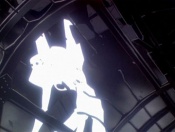
|
Adam | The first human on Earth. Progenitor of all "Angelic" Angels. | 1st | 1st | ? |

|
Lilith | Progenitor of mankind (Lilin) and all other LCL-based organisms on Earth. | 2nd | 2nd | 2nd |
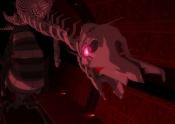
|
Third Angel | Discovered in permafrost prior to Sachiel's attack. Fought Evangelion Unit-05 at Bethany Base in Evangelion 2.0. | - | - | 3rd |
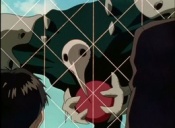
|
Sachiel | First Angel to be encountered in the series. An amphibious humanoid Angel. | 3rd | 3rd | 4th |
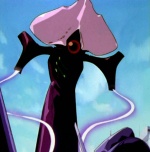
|
Shamshel | Arthropod-like Angel with deadly "whips of light". | 4th | 4th | 5th |
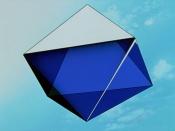
|
Ramiel | Extremely powerful octahedral Angel with deadly particle beam and immensely strong A.T. Field. | 5th | 5th | 6th |
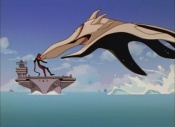
|
Gaghiel | Aquatic Angel the size of an aircraft carrier. | 6th | 6th | - |

|
Seventh Angel | An incredibly tall clock-like Angel. | - | - | 7th |
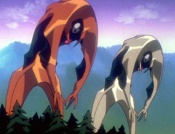
|
Israfel | Angel capable of merging into one body and acting in concert even when separate. | 7th | 7th | - |
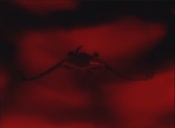
|
Sandalphon | Rapidly matured while still in embryonic stage in volcano. Capable of withstanding extremes of temperature and pressure. Resembles the Cambrian predator Anomalocaris. | 8th | - | - |
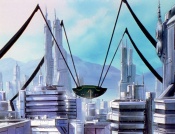
|
Matarael | Four-legged spider-like Angel that secretes acid from its ventral eye. | 9th | - | - |
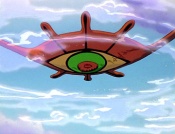
|
Sahaquiel | Monstrous Angel that threatens to destroy Tokyo-3 by falling on the city from low earth orbit. | 10th | Unnumbered[7] | 8th |
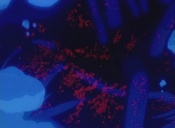
|
Ireul | Microscopic Angel that appears deep inside Nerv Headquarters. Capable of hacking into computer systems. | 11th | - | - |
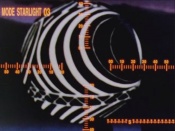
|
Leliel | Angel with a black hole-like shadow body that exists in higher dimensions. | 12th | - | - |
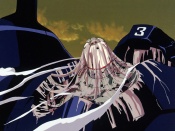
|
Bardiel | Has a physical structure similar to a slime fungus. Parasitizes and gains control over Evangelion Unit-03. | 13th | 8th | 9th |
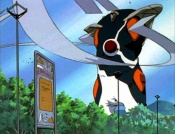
|
Zeruel | Extremely powerful Angel with strong A.T. Field and no shortage of destructive power. Meets an especially brutal fate. | 14th | 9th | 10th |
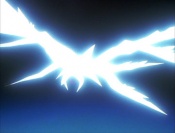
|
Arael | Glowing suborbital bird-like Angel that probes minds with a beam of light. | 15th | 10th | - |

|
Armisael | First appears as a glowing double helix. Capable of changing form and fusing with an Eva. | 16th | 11th | - |

|
Tabris | Ostensibly a fifteen year old human male. Vessel of Adam's soul. | 17th | 12th | ? |
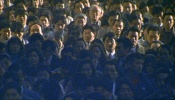
|
Lilin | Humans -- as we tend to think of them. | 18th | 13th | ? |
References
- ↑ Episode 12:
- Misato: "Destroying Angels is my duty."
Ritsuko: "Your duty? Don't make me laugh. This is for your own sake, isn't it? Your revenge against the Angels!" - Misato: "The only thing that was clear to me was I wanted to destroy the Angels who caused the Second Impact. So in order to do that, I joined Nerv."
- Misato: "Destroying Angels is my duty."
- ↑ Lilith's designation as the Second Angel is never provided in-show, although it can be reasonably deduced due to the fact that no Second Angel is ever named, and Lilith is never assigned an ordinal. Its status as Second Angel is stated outright in several supplemental canonical sources (including Bandai's collectible card game, the Classified Information, and Evangelion Chronicle). It is also stated directly in the Rebuild canon:
- Evangelion 1.0: You Are (Not) Alone. Misato (showing Shinji the giant in Central Dogma):
- "[This is] the bringer of life to this planet, and the agent of its extinction. The Second Angel, Lilith."
- Evangelion 1.0: You Are (Not) Alone. Misato (showing Shinji the giant in Central Dogma):
- ↑ Episode 26'. Misato: "Shinji-kun, we humans were born from the one called Lilith -- a source of life, just like Adam. We are the 18th Angel."
- ↑ Neon Genesis Evangelion 2: Another Cases. Kaworu's Scenario: Good Ending.
- ↑ Neon Genesis Evangelion 2. Classified Information. First Ancestral Race.
- ↑ Neon Genesis Evangelion. Episode 14. Platinum subtitles.
- ↑ Sadamoto skips from 7th Angel (Israfel) to 8th Angel (Bardiel), despite having the Evas sortie against Sahaquiel in between.
| Angels |
| Angels (general) |
| First and Second Angels (Seeds of Life): Adam | Lilith |
| Third to Seventeenth Angels (Adam's Children): |
| Sachiel | Shamshel | Ramiel | Gaghiel | Israfel | Sandalphon | Matarael | Sahaquiel |
| Ireul | Leliel | Bardiel | Zeruel | Arael | Armisael | Tabris |
| Eighteenth Angel: Lilin |
| Rebuild of Evangelion: ?Adams? | Lilith | 3rd Angel | 4th Angel | 5th Angel | 6th Angel | 7th Angel | 8th Angel | 9th Angel | 10th Angel | 11th Angel | 12th Angel | 1st/13th Angel |
| Other: Extracanonical Angels |
